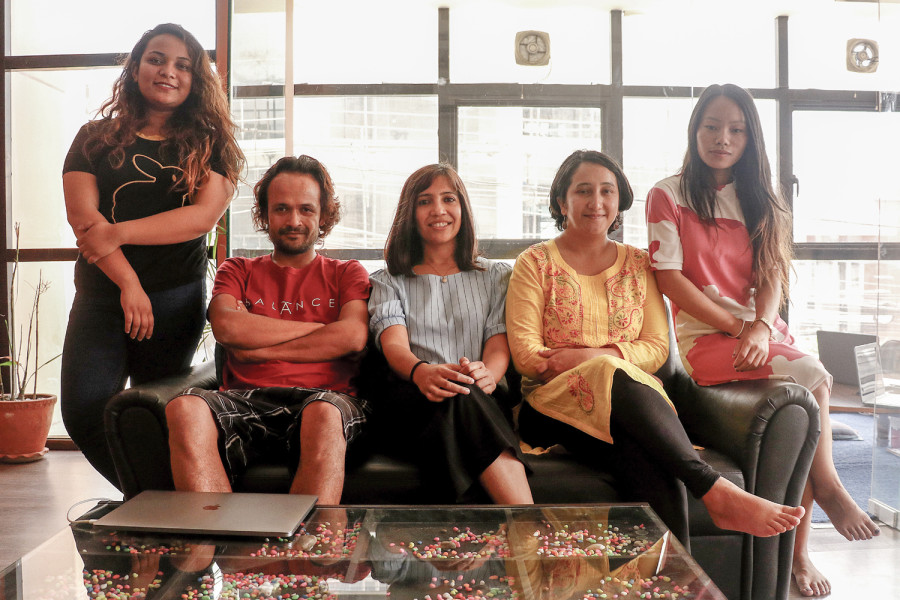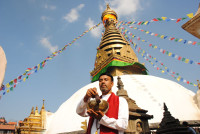Life & Style
How Bidhya Chapagain quit hosting BBC’s Sajha Sawal to forge her own path in journalism
Chapagain took a risk to tell the kind of stories she’d always wanted to, and she hopes to continue doing it for years to come.
Sneha Dahal
Over a year ago, Bidhya Chapagain was a journalist with a coveted job. As the first female host of BBC’s Sajha Sawal, she was interviewing former prime minister, sitting ministers and politicians. But it was her level-headed but incisive interview with Sher Bahadur Deuba that brought her squarely into the public consciousness. While Deuba was ridiculed for the manner in which he answered questions from the audience, Chapagain won praise for the way she moderated the session and the insightful questions she asked.
Then, just as she was winning hearts and minds across the country, in January 2018, she quit the BBC.
“I had an urge to tell the stories of common Nepalis,” said Chapagain. “That’s why I quit the BBC.”
As part of Sajha Sawal, Chapagain had an opportunity to travel to many places across Nepal, where she met people from various backgrounds and heard their stories. But she also realised that their stories were being told as a single narrative, when every single individual had their own stories to share.
“I felt restricted by the format of the programme,” she said. “Working as a presenter, I always felt like something was missing.”
Chapagain asked herself if she was satisfied with her work, and the answer was never a yes.
She started speaking to her colleague Kamal Kumar about how the media in Nepal only reported stories about celebrities, business houses, crime and foreign news. Kumar felt the same way. Together, they quit the BBC and decided to start their own reporting programme—Herne Katha.
“These two words sounded the most organic, as ‘herne’ means something you watch, as the stories are provided as videos on YouTube, and ‘katha’ means stories, which we all have,” said Chapagain.
Chapagain and Kumar believed that the new format of putting videos directly onto Youtube would provide them with more freedom to do the kind of journalism they wanted to.
Chapagain always wanted to do journalism, ever since she saw her brother Mahesh’s byline in the papers. Mahesh encouraged her and with her brother’s support, Chapagain began sending articles to papers like Yuwa Manch and Gorkhapatra while studying journalism at Ratna Rajya Laxmi Campus.
After finishing her Bachelors, she dabbled in radio and television broadcasting. But it was while she was on a gap year that she applied for the job of presenter for Sajha Sawal. In July 2014, she got the job, an enviable job that many aspiring journalists would’ve loved to have.
So when she quit, she remembers how many in the media made fun of her decision.
“Those comments were funny rather than offensive,” said Chapagain.
Chapagain and Kumar’s first video for Herne Katha—‘Euta School ko Katha’—was published on March 1, 2018. The video, which has nearly 200,000 views, depicts the life of young Muslim girls studying in a madrasa where their education is geared towards getting them a teaching job in another madrasa or getting them married. The video received positive reviews from the viewers who praised it for its originality and raw grit. Chapagain says she was overwhelmed to see how supportive people were, despite the video taking up such a challenging religious issue.
When making her videos, Chapagain and her team select locations that larger media houses either intentionally or unintentionally do not visit, like villages in the rural Tarai. They do some research before going on a two-week trip and come back with four to five stories. Then, editing begins and videos are gradually uploaded to the channel on the first and fifteenth of every month. Whenever they feel they are close to the last few videos, they hit the road again.
So far, Herne Katha has 33 videos. The response from the audience has largely been positive. One message from a viewer that really touched her said, “Nepal bujhna ko lagi hami Herne Katha herchau”—We watch Herne Katha to understand Nepal.
She receives messages from Nepalis who’ve migrated abroad, who say they show their children her videos to help them learn about the country their parents were born in.
So far, Chapagain has even won two awards, both shared with Herne Katha co-founder Kumar. At the 2019 Independent Short Awards, they won Best Documentary Short for ‘The Man Who Died’ and the Best Non-fiction at the 2018 Kathmandu International Mountain Film Festival for the same film.
But for Chapagain, these awards pale in comparison to the satisfaction she now gets from her job.
“The most beautiful part is getting to connect with people, despite the language barrier,” she said. “It has been amazing to see how people whom we didn’t understand linguistically understood us perfectly. They would communicate their stories through emotions. What I’ve seen in this job is the true power of human connection.”
Herne Katha picks up stories that are getting lost amidst the crowding of marketable content, said Chapagain. Capturing the unglamorous world of people’s realities is something she always wanted to do.
“What we imagine about people’s worst possible realities sometimes turn out to be nothing like their actual reality,” said Chapagain.
Nepal has stories in abundance, and the Herne Katha team wants to tell these lost stories. The only thing slowing them down is finances. So many stories are on the brink of dying out because they cannot be told, she said.
“All media houses speak of how they give or at least try to give voice to those who haven’t been heard. But is this really true? Do people in this field actually fulfill that promise?” she asked.
Chapagain took a risk to tell the kind of stories she’d always wanted to, and she hopes to continue doing it for years to come.
“If I had continued the [BBC] job, it would’ve brought me fame and money,” she said. “But the satisfaction that Herne Katha provides is like nothing else.”




 22.28°C Kathmandu
22.28°C Kathmandu










